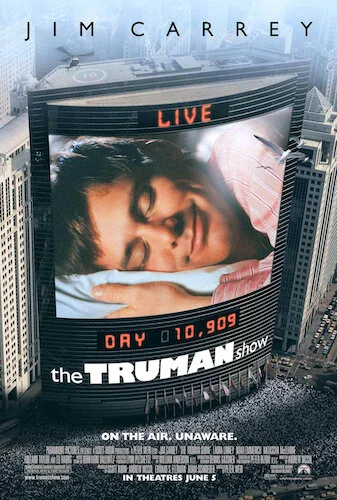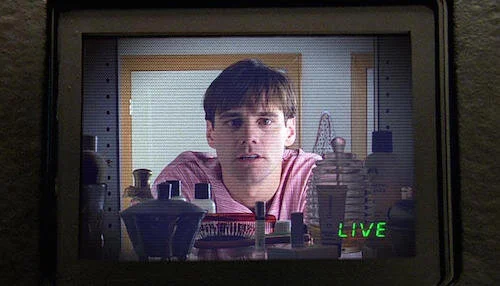The Truman Show: On-This-Day Thursday
Every Thursday, an older film released on this opening weekend years ago will be reviewed. They can be classics, or simply popular films that happened to be released to the world on the same date.
For June 5th, we are going to have a look at The Truman Show.
At the end of the millennium, mainstream cinema was playing catch-up with the philosophical films of foreign, arthouse, and independent circles. So, you have your various cliques that can be found in the ‘90s: the radical social experiments (your Fight Clubs), the more fun approaches (likeThe Matrix), or the films that actually tried to go above and beyond with their statements, thus alienating themselves quite a bit (Being John Malkovich for instance). You can place many films in these categories. American Beauty. Groundhog Day. We could keep going. Whether you like the films or not, there was a lot of dialogue being sparked by films large enough to be a part of the zeitgeist.
Then you have The Truman Show: yet another example that managed to wedge itself in between all of the little categories listed above, and succeeding in all ways. What proves to me that this film works more than just a great premise is how you are still intrigued by it even if you know what it’s all about. Going in blindly may be difficult now, but it even was back when it was released; it was known as that movie about the never-ending television show surrounding Truman, who isn’t aware of what his life actually is. Peter Weir reveals the production side of the story a little into the runtime, so we’re granted the opportunity to be confused for a little bit, as we see Truman’s world from his own perspective. Still, chances are you know exactly what’s happening, because you knew the premise going in.
Truman’s bathroom mirror doubles as meaningful footage for audiences worldwide, especially when he talks to himself.
Again, The Truman Show is hardly concerned with making this a twist-based narrative, so knowing the skinny ahead of time ruins nothing. Truman Burbank’s life is made up of fake sets, actors (even playing his loved ones and dear friends; that’s unsettling), and storylines that are based on-the-fly by whatever decisions he makes. Because of his unawareness of his situation initially, his life just ended up being a daily routine, with the occasional trait that stood out for audiences watching his show worldwide (including his fear of water, tied to the death of his “father” at sea). His attempts at traveling the world are always thwarted in some sort of way. Driven by the toxicity of the aptly named nuclear family mentality, Truman would shrug off any oddities and just suppose that’s how life goes.
Once his world comes crashing down (literally: a stage light meant to represent a star in the sky falls and nearly hits Truman), and other operations begin to malfunction, he becomes aware of what is going on around him. The first portion of the film is very satirical and meant for us viewers, including actors discussing their favourite products (advertisements for the people at home), the similar tone that everyone would speak (an obvious team of screenwriters), and the many different clever camera locations and how Truman would interact with them (in his car dashboard, his bathroom mirror, a button on someone’s shirt, and so forth). These very same details get heightened once Truman gets wiser, with actors looking at designated cameras for help, breaking character, or responding as humans in their field and not as civilians in this fictitious world. Truman’s implied insanity — as a means of getting him to stop snooping around — becomes the calamity of all.
Much of The Truman Show is metaphorically sound, including this stunning climactic image.
Even if the little things didn’t add up (they do in spectacular fashion), The Truman Show is so sound on a profound level as well. The film deals with the perception of self, societal formation, possessions of power, capitalist surrendering, and many other discussions. The best news is the film is beyond digestible for all demographics; it’s compelling enough for snobs like me, and simplistic enough for the general movie going public that don’t desire to be given a difficult time. Over twenty years later, this still rings true. Amongst a number of its peers, The Truman Show resonates, and remains a strong example of a film meant for everyone during the ‘90s. The Truman Show — with its smarts, artistry, humour, and pathos — is proof that not all smart films have to be challenging, and not all inviting films have to be senseless. Worthy of discussions on all fronts, The Truman Show is still relevant, beyond-likeable, and fantastically assembled.
Andreas Babiolakis has a Masters degree in Film and Photography Preservation and Collections Management from Ryerson University, as well as a Bachelors degree in Cinema Studies from York University. His favourite times of year are the Criterion Collection flash sales and the annual Toronto International Film Festival.








